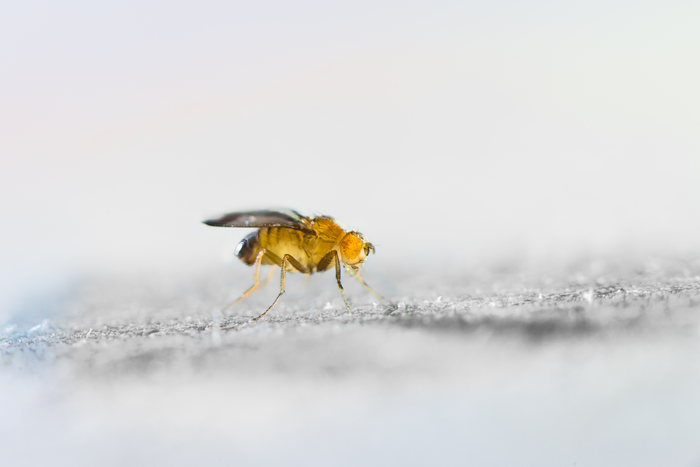When male and female fruit flies age, their brains become desexualized. Age-related changes take place in both sexes, but the male brain becomes feminized to a larger extent than the female brain becomes masculinized. This is the conclusion of a study performed by a research group at Linköping University. The findings are published in the journal Proceedings of the Royal Society of London B.

Credit: Thor Balkhed
When male and female fruit flies age, their brains become desexualized. Age-related changes take place in both sexes, but the male brain becomes feminized to a larger extent than the female brain becomes masculinized. This is the conclusion of a study performed by a research group at Linköping University. The findings are published in the journal Proceedings of the Royal Society of London B.
It is a well-known fact that weaker individuals cannot afford to “invest” in sexual behaviours to the same extent as their healthier conspecifics. However, it is not clear if ageing, which weakens individuals, also leads to a reduced investment in sexual activities. You might think that for individuals close to the end of their lives, going “all in” on reproduction, in order to pass on their genes before it is too late, would be best. Sexual behaviours are directed from the brain, and to find out what happens to sex differences in this tissue when fruit flies age the researchers have investigated how genes expressed to different degrees in young males and females change over time.
“Our results show that gene expression in male and female brains become more similar with age, and that both sexes contribute to this pattern”, says Dr Antonino Malacrinò, one of the study’s main authors who now works at the University of Reggio Calabria in Italy.
What the study shows is that if the expression of a certain gene is higher in the brains of young females than in young males, the gene’s expressions is reduced in older females and increased in old males – and vice versa for genes with higher expression in young males.
“The results also show that the changes are larger in males than in females”, says Antonino Malacrinò.
The fact that females change less with age than males is presumably the result of that the connection between investment in sexual traits and reproductive success is not as strong in females as in males. While a male fruit fly, in order to reproduce, must out-compete other males in quickly finding females and encouraging them to mate through an intricate and taxing dance performance, a female only needs to decide how much energy she has available for reproduction. Ageing implies that reduced amounts of resources are available to invest in reproduction and other activities for both sexes, but stiff competition between males means that the cost of increased investment is greater for them than for females.
“If you keep investing as much as before in reproduction when you get old, you don’t have energy left for survival”, says Urban Friberg, who has led the study and is senior associate professor at the Department of Physics, Chemistry and Biology (IFM) at Linköping University.
Studies on other animals, including humans, which have mainly focused on age-related changes in gene expressions in one sex, have given results pointing in the same direction. This indicates that the results shown in fruit flies may also apply to many other animals.
“We get the same general results in both the populations of fruit flies that we have examined, even if they differ quite a bit with respect to which genes are involved”, says Urban Friberg.
The results of the study are reminiscent of those obtained by the group in a previous investigation. In that study, sex differences in gene expression were compared between male and female flies of high and low genetic quality. Similarly to how ageing reduces sex differences, the earlier study show that reduced genetic quality makes gene expression more similar in male and female flies, and again it was males that changed their gene expression more than females.
The study provides no answer to what molecular signal associated with ageing lies behind the reduced sex differences in the brain. Further exploration on this topic could be rewarding, especially if the signalling molecule would turn out to be shared with other species.
The study was funded with support from the Längmanska Foundation Culture Fund, the Swedish Research Council, the Sven and Lilly Lawkis Fund, the Olle Engqvist Foundation and the Knut and Alice Wallenberg Foundation via National Bioinformatics Infrastructure Sweden.
The article: Ageing desexualizes the Drosophila brain transcriptome, Antonino Malacrinò, Martin I. Brengdahl, Christopher M. Kimber, Avani Mital, Vinesh N. Shenoi, Claudio Mirabello and Urban Friberg, Proceedings of the Royal Society B, Published online August 10 2022 DOI: 10.1098/rspb.2022.1115
Journal
Proceedings of the Royal Society B Biological Sciences
DOI
10.1098/rspb.2022.1115
Article Title
Ageing desexualizes the Drosophila brain transcriptome
Article Publication Date
10-Aug-2022




